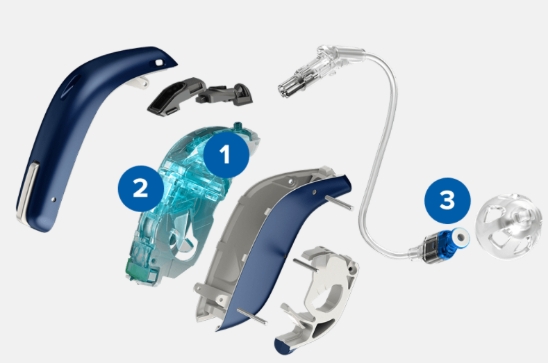Enhance your hearing with Hidden Hearing
Hidden Hearing is dedicated to improving your life through better hearing. We offer state-of-the-art hearing aids from leading hearing care brands such as Oticon and Bernafon. At Hidden Hearing, we invest in the latest technology, ensuring our audiologists provide the best solutions for your hearing needs.
Why Hidden Hearing?
Expert Audiologists: Continuous training keeps us at the forefront of hearing advancements.
Customised Solutions: Personalised care tailored to connect you with your world.
Unmatched Value: Superior patient care and quality, trusted by over 60,000 clients annually.
Visit us across Ireland
Discover better hearing at one of our 80+ clinics nationwide. Experience the Hidden Hearing difference today. When you're ready, talk to us. We're all ears!
![[GEN] The logo features a bold black 'Hidden Hearing' text next to a solid blue speech bubble icon, representing the hearing care services offered by the Hidden Hearing company. No additional text is present.](https://assets-we.rt.demant.com/-/media/project/retail/hidden-hearing/ie/images/logos/hiddenhearing-pos-rgb.svg?iar=0&rev=ff8043932756427ebcbbe4eaa8251fc0&hash=765BCBA6BCF6D52063BF13F365F3B1EE)

![[OPT] Hand holding a small, in-ear hearing aid against a white background.](https://assets-we.rt.demant.com/-/media/project/retail/shared/images/full-width/desktop-1920-x-700/brand-leadform-iic-in-hand-1920.jpg?rev=5f18c991c6ee4e01884492fc9fd3d5b3)
![[OPT] Teacher instructing a child playing the recorder while sitting at a piano.](https://assets-we.rt.demant.com/-/media/project/retail/hidden-hearing/ie/images/text-image---548-x-548/innovative-solutions---548-x-548.jpg?rev=b63c5d304d7e40f8bdf4d19aa575a91e)

![[GEN] A middle-aged man sits at a desk while a woman wearing business attire and a blue necktie gently places a hand on his shoulder, in a professional hearing clinic environment. No visible text or hearing aid brands appear in the image.](https://assets-we.rt.demant.com/-/media/project/retail/shared/images/image-spot---196-x-196/lye-24/xweb2-lye24-imgspot-caravan-clinic-man-196.jpg,qh=196,aiar=0,aw=196,arev=4f5b4a41ca2648b4b69a5005bc76747c,ahash=0C39FD7905EFD9DED90403EC4CA30801.pagespeed.ic.GZm9_oLgdW.jpg)
![[GEN] A person wearing red over-ear headphones during a hearing test in a clinical setting holds a response device, reflecting a typical diagnostic process at a professional hearing clinic. No text is visible.](https://assets-we.rt.demant.com/-/media/project/retail/shared/images/image-spot---196-x-196/lye-24/xweb2-lye24-imgspot-caravan-hearingtest-man-196.jpg,qh=196,aiar=0,aw=196,arev=ff84671053fe4b238d73a63828bb9cc5,ahash=3A2A298BD39D1268B9A80778AB605737.pagespeed.ic.BmSmbE-OaL.jpg)
![[GEN] A smiling man holds a small, discreet hearing aid between his fingers, showcasing its compact design. The background is softly blurred, emphasizing the importance of advanced hearing solutions.](https://assets-we.rt.demant.com/-/media/project/retail/shared/images/image-spot---196-x-196/lye-24/xweb2-lye24-imgspot-caravan-iichearingaidinhand2-196.jpg,qh=196,aiar=0,aw=196,arev=52508bc15962418c96d00b82ff0bf711,ahash=E6BF84961247A9BC0AC8630A0D8E3712.pagespeed.ic.IIUD4O_pdR.jpg)
![[GEN] An audiologist adjusts a hearing aid on an older man seated in a clinical setting, emphasizing hearing care services in a professional hearing clinic. No text is visible in the image.](https://assets-we.rt.demant.com/-/media/project/retail/shared/images/image-spot---196-x-196/lye-24/xweb2-lye24-imgspot-caravan-fitting-man-196.jpg,qh=196,aiar=0,aw=196,arev=c737494f74724d2685cc9f32e229ad58,ahash=DE379B4F796F3D44C561EE4CFBD072F4.pagespeed.ic.Cn4uh-ELJN.jpg)




![[GEN] A close-up of three people with blurred faces, one resting a hand on a child wearing a white lace top, set against a neutral indoor background. No text or hearing aids visible.](https://assets-we.rt.demant.com/-/media/project/retail/hidden-hearing/ie/images/image-spot---196-x-196/xfamilytalkingtogether-196--use-hi-res.jpg,qh=196,aiar=0,aw=196,arev=5fb4de43225140599f81864141ee997f,ahash=00C90837CCA233BB41D926E97CFAD0F6.pagespeed.ic.XvQ5HuGxZ_.jpg)
![[GEN] A fishmonger holding fresh fish engages with an older man and a woman in a vibrant market setting. The fishmonger wears a blue apron with text saying 'We love what we do.'](https://assets-we.rt.demant.com/-/media/project/retail/hidden-hearing/ie/images/image-spot---196-x-196/koconnell-group-taking-use-high-res.jpg?h=196&iar=0&w=196&rev=0ae0cbc32e7e48e3b60024890743691a&hash=6E7BF640EF2A49F089EB0B350E2B132A)

![[GEN] A receptionist wearing a mask writes on a clipboard behind a clear protective screen at a Hidden Hearing clinic, engaging with a customer in a white hoodie. Text on the wall reads 'Hidden Hearing.'](https://assets-we.rt.demant.com/-/media/project/retail/hidden-hearing/ie/images/image-spot---196-x-196/template196pxcirclehi_res2_196x196-v2.jpg?h=196&iar=0&w=196&rev=980b7a09c1a145d983f4c3548ed4cae5&hash=340FF048F256A96F43AA24DFFC80BCC9)
![[OPT] A man holding a phone to his ear while seated indoors](https://assets-we.rt.demant.com/-/media/project/retail/hidden-hearing/ie/images/image-spot---196-x-196/xman-on-the-phone-196.png,qh=196,aiar=0,aw=196,arev=b299ac4cf2934ed582ab3e016557440a,ahash=640C0B80242EC14CEBD94C3C50B122E2.pagespeed.ic.EwiHVJGdnn.png)


![[GEN] A hearing care specialist consults a seated couple in a modern clinic, discussing hearing aids as a man wears a device during the session. A tablet rests on the table.](https://assets-we.rt.demant.com/-/media/project/retail/shared/images/full-width/lye-24/desktop---1920/web2-lye24-campaign-caravan-clinic-1920.jpg?rev=587779b8d011446592abe87415f316a6)
![[OPT] Hidden Hearing hearing care expert Jim Williamson](https://assets-we.rt.demant.com/-/media/project/retail/hidden-hearing/ie/images/image-spot---196-x-196/audiologists/audiologist-jim-williamson.jpg?h=196&iar=0&w=196&rev=594a4b2a672e45ef9546cbaff0e5e6b4&hash=39393F979EFC8AEB94F4D5E53729FFC7)